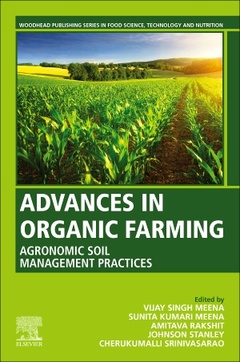Description
Advances in Organic Farming
Agronomic Soil Management Practices
Coordinators: Meena Vijay Singh, Meena Sunita Kumari, Rakshit Amitava, Stanley Johnson, Rao Srinivasa
Language: English
Subjects for Advances in Organic Farming:
Keywords
Abiotic stress; Bacteria; Bio-ameliorators; Bioavailability; Bio-control agents; Bio-effectors; Biofertilizers; Biopesticides; Biostimulants; Biotic stress; Certification; Certified organic; Community-supported agriculture; Compost; Conservation agriculture; Crop growth and protection; Crops; Cyanobacteria; Ecovida Agroecology Network; Environment and society; Farming system; Farmyard manure; Fungi; Green sustainable concrete; Halophiles; IFOAM; Impact of health; Industrial waste; Micronutrient availability; Microorganism; Nutrient; Nutrient recycling; Nutrients; organic farming; Organic farming; Organic food; Organic manures; Organic plant breeding; Organic plant nutrient; Organic seed; Organic soils; Organics; Participatory Guarantee System; Pesticides; Pests; PGPR; Phytohormones; Plant and human health; Plastic waste; Production management; Protection; Protein; Recycled waste; Salt stress; Soil biological activity; Soil enzymes; Soil fertility; Soil health; Soil organic carbon; Soil quality and fertility; Solid waste; Stress enzymes; Sustainability; Sustainable agriculture; Third-party certification; Tillage; Transformations and sorption; Vegetable production
270 p. · 15.2x22.8 cm · Paperback
Description
/li>Contents
/li>Biography
/li>Comment
/li>
Advances in Organic Farming: Agronomic Soil Management Practices focuses on the integrated interactions between soil-plant-microbe-environment elements in a functioning ecosystem. It explains sustainable nutrient management under organic farming and agriculture, with chapters focusing on the role of nutrient management in sustaining global ecosystems, the remediation of polluted soils, conservation practices, degradation of pollutants, biofertilizers and biopesticides, critical biogeochemical cycles, potential responses for current and impending environmental change, and other critical factors. Organic farming is both challenging and exciting, as its practice of ?feeding the soil, not the plant provides opportunity to better understand why some growing methods are preferred over others.
In the simplest terms, organic growing is based on maintaining a living soil with a diverse population of micro and macro soil organisms. Organic matter (OM) is maintained in the soil through the addition of compost, animal manure, green manures and the avoidance of excess mechanization.
2. Soil fertility in organic farming
3. Microbial community structure in organic farming and management
4. Microbial biostimulants under organic farming management
5. Conservative agricultural practices (CAPs) under organic farming
6. Role of unculturable microbes in organic farming production
7. Remediation of salt affected soils through microbes to promote organic farming
8. Organic plant nutrient, protection and production management
9. Towards the soil micronutrient availability under organic farming
10. Biofertilizers and biopesticides in organic farming
11. Towards the mitigation of biotic and abiotic stress through plant growth promoting rhizobacteria
12. Organic farming with management software
13. Outlooks of nanotechnology in organic farming management
14. Towards the quality and healthy organic production system
15. Organic oilseed production
16. Organic vegetable production and its impact on soil, environment and society
17. Towards the organic product certification
Dr. Vijay Singh Meena has made remarkable contributions in the field of agricultural research, aligning his efforts with the United Nations Sustainable Development Goals (SDGs). Particularly, his work focuses on evaluating and promoting climate-resilient technologies for diverse cropping systems, directly contributing to SDG 2 (Zero Hunger) and SDG 13 (Climate Action).
His expertise lies in optimizing input usage, fostering carbon-neutral farming practices, and enhancing productivity and profitability in agriculture, which are integral to achieving SDG 2 by ensuring food security and promoting sustainable agriculture. Furthermore, his initiatives in evaluating climate-resilient technologies align with SDG 13 by addressing climate change impacts and promoting adaptation measures in agriculture.
Dr. Meena's academic background in Soil Science and Cropping System Management, coupled with his extensive research experience, has equipped him with a profound understanding of cropping systems. His expertise in input optimization, quantitative cropping systems analysis, and soil health management has significantly contributed to improving livelihoods in South Asia, thus supporting SDG 1 (No Poverty) and SDG 2.
Furthermore, Dr. Meena has been recognized for his scientific excellence, receiving prestigious awards such as the INSA Young Scientist Award and the IASWC Budding Scientist Award, which further highlights his contributions towards achieving the SDGs. In summary, Dr. Vijay Singh Meena's outstanding achievements, leadership abilities, and commitment to agricultural innovation directly contribute to advancing the SDGs, particularly SDG 2 (Zero Hunger) and SDG 13 (Climate Action), and make him a valuable asset in promoting climate-resilient agriculture and sustainable food systems.
Ms. Sunita Kumari Meena - is an accomplished professional serving as an Assistant Professor at RPCAU (Dr. Rajendra Prasad Central Agricultural Uni
- Presents a comprehensive overview of recent advances and new developments in the field OF research within a relevant theoretical framework
- Highlights the scope of the inexpensive and improved management practices
- Focuses on the role of nutrient management in sustaining the ecosystems




